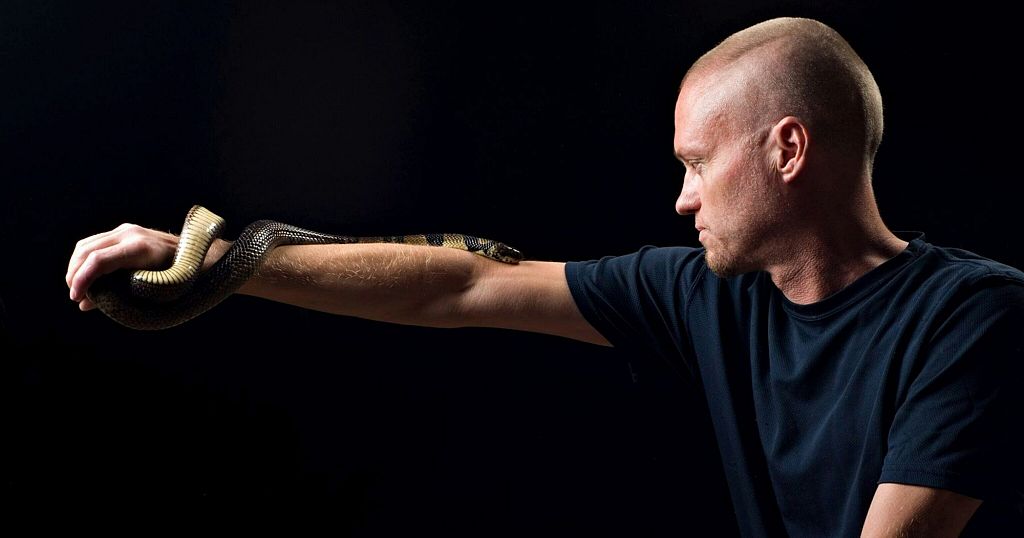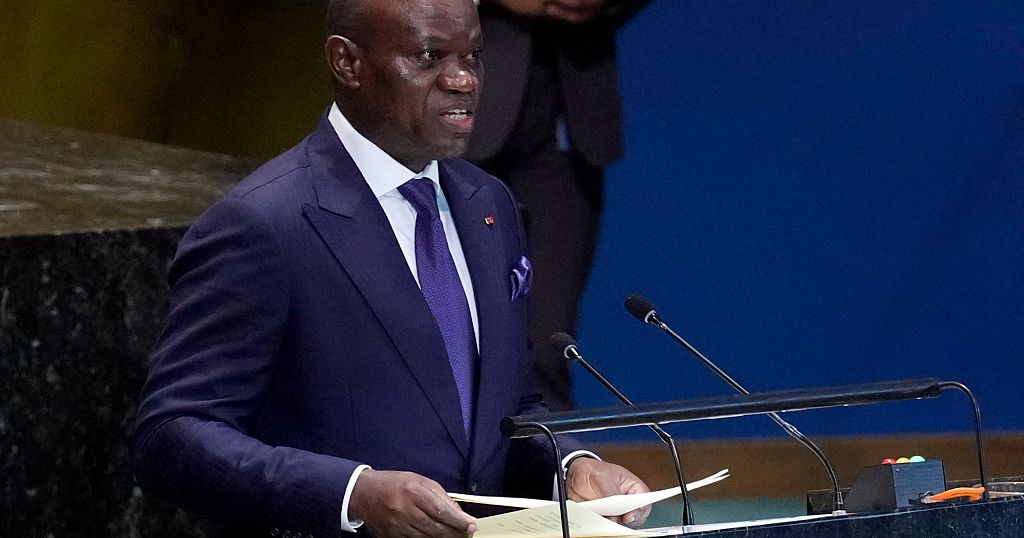Africa
Snake Man: His Immunity Might Cure Bites

If you’re afraid of snakes then look away now. Tim Friede from Wisconsin, USA is certainly not afraid of snakes and has been bitten hundreds of times — often on purpose. Now scientists are studying his blood in the hope of creating a better treatment for snake bites.
Friede has long had a fascination with reptiles and other venomous creatures. He used to milk scorpions’ and spiders’ venom as a hobby and kept dozens of snakes at his Wisconsin home. Hoping to protect himself from snake bites — and out of what he calls “simple curiosity” — he began injecting himself with small doses of snake venom and then slowly increased the amount to try to build up tolerance. Friede explains his method: “I take it out and I basically let it bite my arm. And the reason I do that is for shock value to bring awareness for snakebite.
Nobody wants to see me just inject a lethal dose. That’s boring. So what I did is I intentionally got bit to prove a point and film it, to represent the people that die from snakebites. I wasn’t looking to be a YouTube star or anything like that. It’s all about the science for me, 100%.” It falls under the category of ‘DON’T TRY THIS AT HOME’ and no doctor or emergency medical technician — or anyone, really — would ever suggest this is a good idea, but experts say his unorthodox method tracks how the body works. When the immune system is exposed to the toxins in snake venom, it develops antibodies that can neutralize the poison.
If it’s a small amount of venom the body can react before it’s overwhelmed. And if it’s venom the body has seen before, it can react more quickly and handle larger exposures. Friede has withstood snakebites and injections for nearly two decades and still has a refrigerator full of venom. In videos posted to his YouTube channel, he shows off swollen fang marks on his arms from black mamba, taipan and water cobra bites. But Friede also wants to help. He emailed every scientist he could find, asking them to study his body and the immunity he’d built up. And there is a need: Around 110,000 people die from snakebite every year, according to the World Health Organization. Making antivenom is expensive and difficult. It is often created by injecting large mammals like horses with venom and collecting the antibodies they produce.
These antivenoms are usually only effective against specific snake species, and can sometimes produce bad reactions due to their non-human origins. Peter Kwong from Columbia University says: “So in this study, what we’re really excited about are two things. First, we might have a working cocktail that could be developed in a few years, but also it shows what the human immune system can do.
We have antibodies produced in a human that might save other humans moving forwards in terms of a universal antivenom.” In a study published in the journal Cell, Kwong and collaborators shared what they were able to do with Friede’s unique blood: They created an experimental antivenom that they hope could one day treat bites from many different snake species. “So Tim basically created a procedure that allowed broad recognition of many, many different toxins moving forward, and that recognition allowed him to be protected from snakebites, and what we’re hoping to do is take that same protection but not have to have everyone undergo 18 years of immunization and snake bites, ultimately. But instead, isolate and identify the best antibodies.
Or we can combine with small molecules to create anti-venom from Tim’s amazing blood,” says Kwong. It’s very early research — the antivenom was only tested in mice, and researchers are still years away from human trials. And even though their experimental treatment shows promise against the group of snakes that include mambas and cobras, it’s not effective against vipers, which include snakes like rattlers. “I picked the most dangerous ones in the world, black mambas, taipans, cobras, kraits, coral snakes, rattlesnakes.” says Friede. “I couldn’t get every single snake I wanted to have. Some you just can’t get. And I don’t like taking stuff out of the wild. So, you know, I had to pick and choose.” Friede’s journey has not been without its missteps.
Among them: He said after one bad snake bite he had to cut off part of his finger and some particularly nasty cobra bites sent him to the hospital. Friede explains the risks he has faced: “I had no antivenom. I worked with no doctors. Well, I do now, but back then I didn’t, I just had so much confidence on what I was doing to where I didn’t want to back up. And it made me stronger and better at what I did because I depended on myself.
And if I failed and I died, then I die, I mean, it was that simple. It became a lifestyle actually.” Friede is now employed by Centivax, which is trying to develop the treatment, and he’s excited that his 18-year odyssey could one day save lives from snakebite. “When I was doing it, I sat back after about a year and just realised that people died from snakebite and I wasn’t dying. So at that point I decided I have to reach out to every scientist on the planet. Which I did, reached out to a lot of them. Can you study me? What can we do to save people from snake bite? And that just escalated like crazy. It just went nuts, for good reasons though. I became the horse. I took the horse out the picture. And that’s how they make anti-venom, in horses. So I used myself,” he says.
But his message to those inspired to follow in his footsteps is quite simple: “Don’t do it!” But if one day his blood could save lives, then it’s been worth it. “It’s nice to be part of something that changes medical history, herpetology, immunology, and science,” says Friede. Friede could be making hiss-tory.
Africa
Nguema takes power in Gabon

General Brice Clotaire Oligui Nguema was sworn in as president of Gabon Saturday after winning almost 95% of votes in April 12 election, having served as interim president since taking power in a 2023 coup. Nguema, 50, won the election with 58,074 votes, which accounts for 94.85% of votes cast, according to the final results announced by the Constitutional Court.
He was expected to win the election, being widely seen in the Central African country as the man who put an end to the Bongo dynasty, which ruled the country for more than 50 years. Nguema, the former head of the country’s Republican Guard, toppled President Ali Bongo Ondimba nearly two years ago. Following the coup, soldiers proclaimed Nguema, a cousin of deposed president Ali Bongo Ondimba, as president of a transitional committee to lead the country.
Many accused the Bongo family of living in oil-funded luxury while much of the population struggled. The inauguration was held in the Angondjé stadium and was attended by several high profile African leaders, including both President Felix Tshisekedi of Congo and President Paul Kagame of Rwanda, who have been in peace talks in recent months due to the ongoing conflict between Congolese forces and Rwanda-backed rebels in Congo’s east.
This year’s election was seen as a crucial election for the central African nation’s 2.3 million people, a third of whom live in poverty despite its vast oil wealth. Nguema gained support on a platform of anti-corruption and promised to develop the country, focusing on key campaign promises including improving the healthcare sector, building roads, and giving jobs to young people.
Africa
Lyoya shooting: Officer takes the stand

A Michigan police officer who killed a man with a shot to the back of the head is testifying in his own defence at his second-degree murder trial. Christopher Schurr says he was “running on fumes” and fearing for his life when 26-year-old Patrick Lyoya got control of his Taser.
He says he shot Lyoya in Grand Rapids because he thought he would be killed. The issue for jurors is whether they believe Schurr had a reasonable belief that his life was in jeopardy after Lyoya got control of his Taser during a fight. Lyoya was facedown on the ground when Schurr shot him. It’s not known why Lyoya was trying to flee. Records show his driver’s license was revoked at the time and there was an arrest warrant for him in a domestic violence case, though Schurr didn’t know it.
An autopsy revealed his blood-alcohol level was three times above the legal limit for driving, according to testimony. During cross-examination, prosecutor Chris Becker tried to highlight inconsistencies between Schurr’s testimony and his statements to investigators three years ago, particularly his physical condition at the time.
Becker also noted that the officer was on top of Lyoya before the fatal shot, suggesting that he had an advantage. “He never said he was going to kill you, right? Never said he was going to hit you. Never said he was going to kick your butt or do anything bad to you,” the prosecutor said. Schurr earlier testified that he had a Taser used on him during police training and knew it could cause “excruciating pain.”
“I shot him because I believed he was going to use it on me,” Schurr told Becker. “He started to turn up towards me. I felt if I didn’t respond at that time, I wouldn’t be here.” “Sure, but he’s not here, is he?” Becker shot back, referring to Lyoya’s death. “No, he’s not,” Schurr replied.
Africa
Fear and uncertainty grip Haitian workers in Texas meatpacking plants amid immigration crackdown

In the quiet town of Cactus, Texas, Haitian migrants like Nicole and Idaneau Mintor are facing a new wave of fear and uncertainty. Both work long hours at the JBS meatpacking plant—home to 3,700 workers, many of them immigrants—debating whether the American dream they chased is now slipping away.
Nicole, who arrived through the CBP One program last November, says she was drawn to the region for its job opportunities and higher wages. She earns more than $20 an hour deboning cattle—money she could never have hoped to make in Haiti. But earlier this month, she received a message warning her to leave the U.S. within seven days or face deportation or fines.
“They would consider going back to Haiti,” she said in Haitian Creole. “But the country is in a bad situation right now. You can’t make a decision. You have no idea what to do.”
The Biden-era immigration parole program allowed hundreds of thousands from Haiti, Cuba, Nicaragua, and Venezuela to enter legally. But recent actions under Donald Trump’s renewed crackdown have thrown those protections into question. Although a federal judge has temporarily blocked enforcement of deportation notices, many like Nicole still live in fear of losing their jobs, homes, and work permits.
“I don’t steal. I pay my bills. I respect the laws,” said Mintor. “But they are planning to take away my work permit.”
For these workers, the uncertainty is not just legal—it’s existential. With no clear path forward and no safe way back, their futures hang in limbo.
-

 Conflict Zones2 days ago
Conflict Zones2 days agoYemen’s Houthis launch missiles at Israel, army says it intercepts | Houthis News
-

 Middle East2 days ago
Middle East2 days agoICJ hearing on Israel’s obligation to allow aid to Palestine: Key takeaways | Israel-Palestine conflict News
-

 Middle East22 hours ago
Middle East22 hours agoIran reasserts uranium enrichment rights as further US talks delayed | Nuclear Energy News
-

 Europe1 day ago
Europe1 day agoReform UK wins fifth seat in parliament by just six votes as populist party’s support strengthens
-

 Middle East1 day ago
Middle East1 day agoFear, pain, and a little hope: Volunteer doctors in Gaza | Israel-Palestine conflict News
-

 Middle East1 day ago
Middle East1 day agoIsraeli attacks kill two more as Syria government reaches deal with Druze | News
-

 Africa2 days ago
Africa2 days agoLyoya shooting: Officer takes the stand
-

 Conflict Zones20 hours ago
Conflict Zones20 hours agoHouthis maintain pressure on Israel as US launches more strikes on Yemen | Politics News




